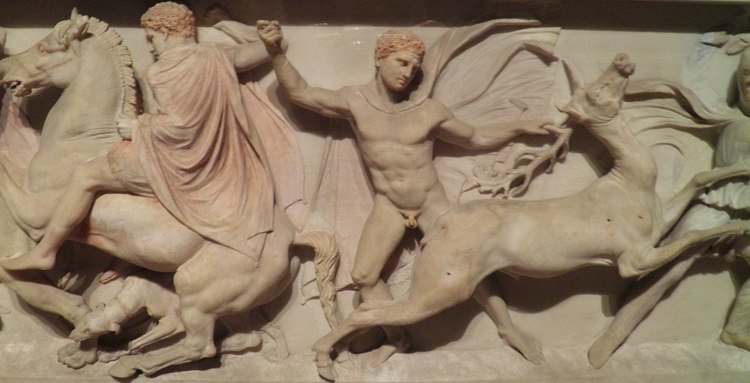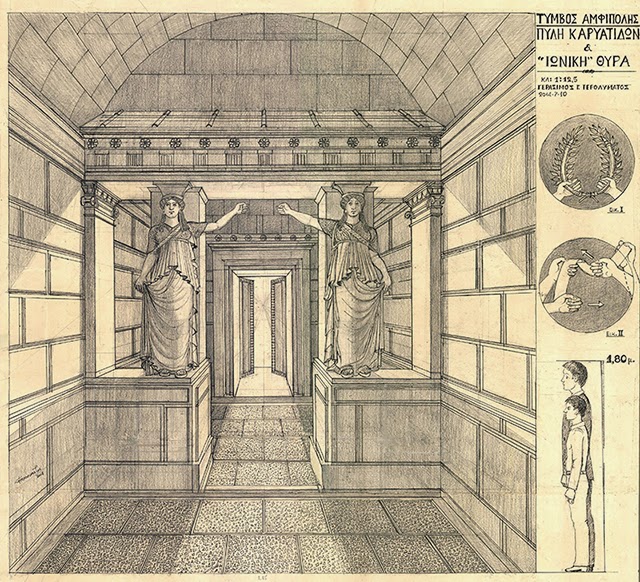Hephaestion was the life partner and general of Alexander the Great, one of the most legendary conquerors in human history. I don’t use “life partner” as a veiled term for lover – he was never described in the texts we have as Alexander’s eromenos or erastes like his Persian courtesan, Bagoas. Hephaistion and Alexander are generally thought to have been lovers by most historians, but more importantly, they truly were partners in life. Hephaestion was a crucial part in Alexander’s success over a series of decades, not only in the role he played through military campaigns, but also as Alexander’s dearest confidant.

We do not have any evidence to suggest Hephaestion had any romantic or sexual partners at all, and only married a wife who had been assigned to him by Alexander as a political act to help integrate Persian culture into their court. As queer people who may have known a person larger than life as Alexander, we can extrapolate that if their relationship was romantic but not sexual, Hephaistion may have been asexual, and Alexander may have taken Bagoas as a sexual partner to fill those particular needs.
Several people who knew Alexander personally wrote of their experiences with him, but unfortunately these direct sources have been lost to us, and we only have third party accounts from narrators of varying degrees of reliability. Therefore any extrapolation we can make are just like any knowledge we have of him at all – extrapolations.
But it cannot be denied that Hephaestion was Alexander’s dearest and closest partner through life.

In 2012, a regal tomb in the Macedonian style was discovered in Northern Greece, as part of a larger complex being explored since the 1970s. The Kasta Tomb. They’re still researching and exploring just who’s remains are interned there, but in 2015 Hephaestion’s monogram was found. The lead archeologist Katerina Peristeri says this is evidence that the whole tomb is a funerary monument for Hephaestion, built between 325–300 BC.
When Hephaestion died, Alexander began the downward emotional spiral that would eventually lead to his own death, 8 months later. Those 8 months were occupied with petitioning the oracle of Siwa to grant divine status to Hephaestion, which was granted. Hephaestion would be worshipped for centuries to come as a divine hero. Cults dedicated to honoring real people who had achieved divine status were eventually wiped out by the Christian empire in an unforgivable homogenization of spirituality from which we have yet to recover. The cult of Antinous, another king’s beloved who was worshipped by large swaths of people from various countries, was another victim of this eradication. Now, with a monument honoring Hephaestion discovered, we can take up that mantle again if we choose.
Regardless of your feelings about Alexander’s campaign (He was after all a conqueror, though arguably a conqueror of a different sort than those previously mentioned.) his glorification of Hephaestion in death was a lasting and spiritual tribute to same sex devotion.
The Kasta tomb is due to open to the public in 2020, and I will be watching for updates when the time comes. It is time we began to have our pilgrimage sites to visit, tragic and celebratory, modern and ancient, active and dormant. These are world-changing monuments to the power of our love, and they are part of our heritage as LGBT people. We are a people who have been violently and systematically isolated from spirituality, religion, and our own histories. It is time to reclaim them. If you visit this beautiful monument in 2020 or beyond, do not think of it as crumbling traces of a past civilization. Think of it as a living monument built for you, by a man who wanted his beloved friend to be celebrated.
Resources for further research:







0 Comments